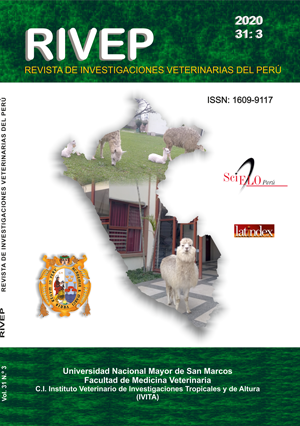A co-culture system with cumulus oophurus cells improves the quality of bovine embryos produced in vitro
DOI:
https://doi.org/10.15381/rivep.v31i3.18181Keywords:
cumulus oophurus, in vitro fertilization, in vitro culture, embryonic viability, enzymatic activityAbstract
The aim of this study was to determine the influence of a co-culture system with cumulus oophorus cells on the quality of bovine embryos produced in vitro, based on their viability. Ovaries from crossbred bovine slaughtered at the Chachapoyas Municipal Benefit Centre, Amazonas, Peru, were used. Oocytes aspirated from 2-6 mm follicles were matured in TCM-199 medium for 24 hours, in a humidified atmosphere with 6% CO2 and 38.5 °C. The maturation state was determined by the nuclear stage through aceto-orcein staining. The mature oocytes were fertilized in vitro with frozen semen from Angus bulls for 18 hours. The presumed zygotes were randomly distributed for development in one group in medium with co-culture and another in medium without co-culture (control). The embryonic quality was determined based on the enzymatic activity and DNA damage of the embryos on the seventh day of culture, using the fluorochromes fluorescein diacetate (FDA) and propidium iodide (PI), respectively. No significant association (p>0.05) was found in the number of embryos produced in vitro, but there was a significant difference in embryonic viability in favour of the system with co-culture (p<0.05). The use of co-cultures with cumulus oophurus cells improves viability and, therefore, embryonic quality, without influencing the rate of embryo production in vitro.
Downloads
Downloads
Published
Issue
Section
License
Copyright (c) 2020 Susana Guevara-Chacón, Hurley Abel Quispe-Ccasa, José Américo Saucedo-Uriarte, Ilse Silvia Cayo-Colca

This work is licensed under a Creative Commons Attribution-NonCommercial-ShareAlike 4.0 International License.
AUTHORS RETAIN THEIR RIGHTS:
a. Authors retain their trade mark rights and patent, and also on any process or procedure described in the article.
b. Authors retain their right to share, copy, distribute, perform and publicly communicate their article (eg, to place their article in an institutional repository or publish it in a book), with an acknowledgment of its initial publication in the Revista de Investigaciones Veterinarias del Perú (RIVEP).
c. Authors retain theirs right to make a subsequent publication of their work, to use the article or any part thereof (eg a compilation of his papers, lecture notes, thesis, or a book), always indicating the source of publication (the originator of the work, journal, volume, number and date).










